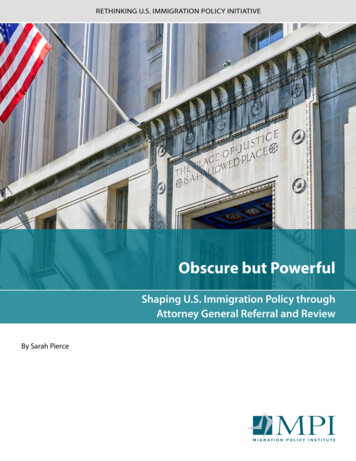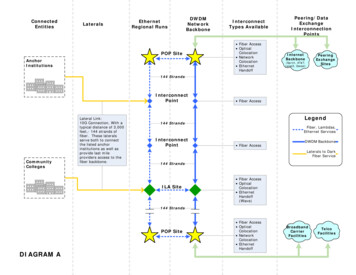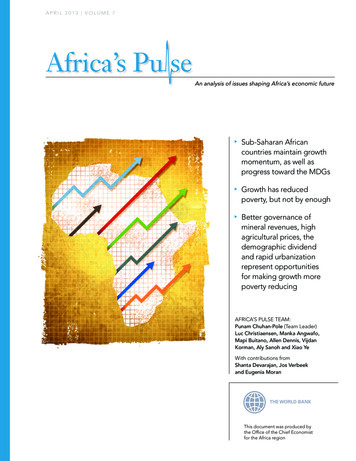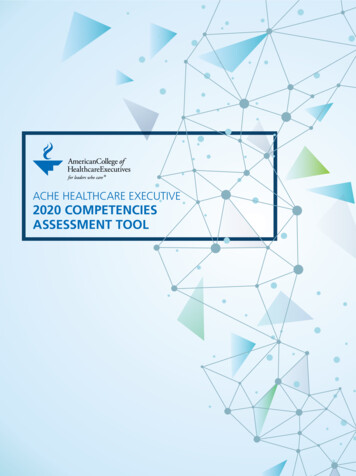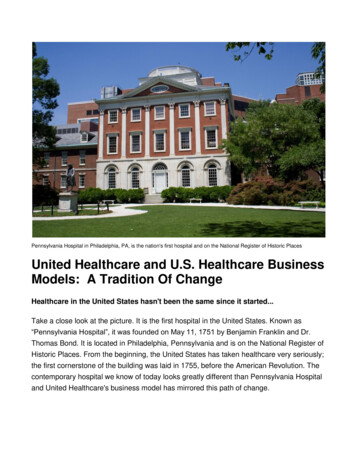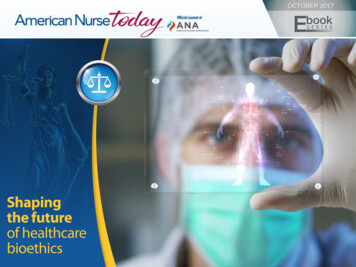
Transcription
OCTOBER 2017EbookSERIESShapingthe futureof healthcarebioethics
What is bioethics?Bioethical issuesCommon bioethical issues involve the rightsof patients, the responsibilities of healthcareprofessionals, and the interests of society.Bioethics is the multidisciplinary study and discussion of the legal, medical, andethical questions that surround health care, health science, and health policy.Types of issuesabortion geneticsdeath Janet L. Dolgin, JDJack and Freda DickerDistinguished Professor ofHealth Care Law at Hofstra Laworgantransplantsprivacy“Bioethics includes questions about life and death,relationships, and personhood—everything thatis essential to being human. It addresses a verycomplicated question: what does it mean tobe a human being? It’s a hard question, butwe can’t stop asking and discussing it.”researchon humansubjectsEbookSERIES
Landmark legal case that changed bioethicsGreatBioethicsbioethicalis the multidisciplinarylegal cases of thestudypast haveand discussionshaped healthcareof the legal,practicemedical,andandwillcontinueto do so.thatHeresurroundare threehealthcases, care,with healthcommentaryDolgin.ethical questionsscience,fromandProfessorhealth policy.Informed consent and its challengesInsight from Professor DolginSalgo v. Leland Stanford Jr. University Board of Trustees (1957)The term “informed consent” first emerged during the Martin Salgo case.Physicians advised the arteriosclerosis sufferer to submit to a procedure.With Salgo under sedation, physicians injected his aorta with a chemicalthat enhances X-ray images, after which they recorded abdominal aortablockages. The next day, Salgo couldn’t move his lower extremities.Legislation resulting fromthe case mandates thatphysicians must exercisegood judgment in fullydisclosing procedural risk.Consequently, physiciansviolate their ethical duty bywithholding any informationthat a patient requires tomake an informed decisionabout medical procedures.“This is the first case to use the term “informed consent,” whichis now well accepted. Despite this, obtaining informed consentis still challenging in today’s world of practice with increasedpressures on providers’ time. What do you tell a patient andwhen and how?The task of talking to patients about their options demandsa serious comprehension of complex clinical issues and thecapacity to understand nuance and compassion. It’s crucialthat healthcare professionals know that part of being a healeris talking to patients in a manner and a language they canunderstand. Nurses are in a wonderful position to ensurepatients receive informed consent.”EbookSERIES
Landmark legal case that changed bioethicsPatient privacy and reproductive rightsGriswold v. Connecticut (1965)The Estelle Griswold case established privacy as a guaranteed right andmarked the first time the Supreme Court granted privacy rights thatextend constitutional guarantees. This privilege, called a penumbralright, relates to “making express guarantees fully meaningful” as spelledout in the Bill of Rights.Griswold was a director of a PlannedParenthood center whom authoritiesarrested, along with the director ofanother center. At the time, state lawdecreed that contraception and assistingothers in using contraception wasillegal. The case resulted in a ruling thatdelineated marriage as a relationshipthat the constitution deems private andprotected from state intervention, thussetting a precedent for future privacyrelated issues.Insight from Professor Dolgin“The notion of patient privacy was important before, but theGriswold case brought the notion of privacy into the contextof reproductive rights. It declared it a constitutional right todistribute, buy, and use contraception for married people. Itwasn’t until 1972 that the Supreme Court extended the right tounmarried people.In some ways, this case foreshadowed the jurisprudentialframework underlying Roe v. Wade, which is still one ofthe most controversial cases ever decided by the SupremeCourt. That case, of course, provided women with a limitedright to abortion. The real issue now is financial resources.There is no constitutional right to health care, and there isno constitutional right to have the government, includingMedicaid, pay for abortion.”EbookSERIES
Landmark legal case that changed bioethicsChanging how unborn children are viewedDavis v. Davis (1993)In this case, divorcees Lewis and Mary Sue Davis disagreed over what to do withthe couple’s preserved embryos. After consulting with the American FertilitySociety, the court determined that although embryos don’t represent individualsor personal property, they should receive special treatment because of theirpotential to create human life.As a result, the court created a system to classify priorities when hearing similar cases.1. The court considers the wishes of the natural parents.2. I f the natural parents have opposing desires or are unsure of how they wouldlike to proceed, the court defers to any previously established agreements.3. If a pre-established agreement does not exist, thecourt will make a judgment based on the parents’interests. Priority will be given to the parent seeking toavoid natural childbirth in either of the two previouscircumstances. That is, if the other parent can produceoffspring naturally and within reason or wants todonate existing genetic material to another party.This case, along with several others, changed how societyand medical professionals view unborn children.Insight from Professor Dolgin“The first baby born conceived by invitro fertilizationwas born in 1978. This event has led to many disputes and challenges about the right to controlgametes and embryos.The Davis case was heard by three Tennesseecourts. Every court had a different vision of whatthe embryos were. The trial court said they werechildren, the appellate court said they were property,and the Tennessee State Supreme Court said theywere pre-embryos like tissue or organs with a specialstatus. The court also recommended that couplesenter into contracts before they freeze embryos,and that these prior contracts will prevail. This casebecame a model in many other states.Today there are similar disputes about embryosgestated by surrogates, and there will potentially becomparable cases involving human cloning andgenetic engineering in the future. ”EbookSERIES
Get involved with bioethics issuesEvery new technology and medical advance brings new bioethicalquestions and issues that touch on the practice of nurses and otherhealthcare professionals. Take these steps to stay on top of issues and actas an advocate as needed. Be familiar with the American Nurses Association Code of Ethics forNurses with Interpretive Statements. It can help you make choiceswhen you’re in difficult situations. Meet with your legislators to establish a relationship. The timeinvested will pay off when you want your voice heard on a billrelated to an ethical issue. Get involved in your professional associations. You’ll be able tosupport the association’s initiatives. Stay informed by connecting with associations offering resources.Organization resourcesn American Nurse Association Center forEthics and Human RightsAccess the code of ethics, along with articlesand position statements.n American Society of Law,Medicine, and EthicsNetwork and learn more about majorbioethical and legal issues with far-reachingsocial ramifications.n American Society for Bioethicsand HumanitiesConnect with bioethics professionals andlearn more about bioethics, professionaldevelopment, and career opportunities.EbookSERIES
Shape your future with a degreeAs the issues and litigation surrounding bioethical concerns grows more complex, the demandwill rise for more individuals skilled in navigating the courtroom. Nurses and other healthcareprofessionals are in an optimal position to shape the future of bioethics in today’s rapidlychanging healthcare system.Opportunities in health lawWho benefits from a health law degreen Bioethics consultation in healthcaren Registered nurses and advancedorganizations, government agencies, andprivate organizationsn Providing expert testimony incourts of lawn Healthcare administrationn Legal nurse consultingn Teachingn Ethics committeespractice nursesn Health administratorsn Insurance professionalsn Health educatorsn Healthcare social workers“It’s critically important for nurses to learnabout bioethics because they are at theforefront of providing good health carefor everybody. A master of arts in healthlaw and policy opens doors for nursesthat are already before them.”Janet L. Dolgin, JDJack and Freda Dicker DistinguishedProfessor of Health Care LawProfessor of Science EducationHofstra Northwell School of Medicinen Social community service managersn Compliance officersn Clinical ethicists and organization ethicistsEbookSERIES
ABOUT THE SPONSOROnline Master of Arts inHealth Law and PolicyPhone: law.hofstra.eduADVOCATE FORPATIENTS THROUGHLAW AND POLICYWorking to improve health care through law and policy can effect change across the nation, assuringa more effective, affordable and positive experience when patients require care. While you may beconsidering a MHA or MBA program, Hofstra Law’s Online Master of Arts in Health Law and Policycan provide legal expertise unmatched by other degrees.Working to improve health care through law and policy can effect change across the nation,assuring a more effective, affordable and positive experience when patients require care. While youmay be considering a MHA or MBA program, Hofstra Law’s Online Master of Arts in Health Lawand Policy can provide legal expertise unmatched by other degrees.Designed by health law experts, our program covers topics making headlines today. Take courses thatfocus on key areas of health law and policy, such as: Health care reform Business transactions Drug development Bioethics Compliance Public healthDesigned by health law experts, our program covers topics making headlines today. Takecourses that focus on key areas of health law and policy, such as:EXAMLearn at your conveniencewith 100% onlinecourseworkn Health care reformn Business transactionsn Bioethicsn ComplianceCollaborate with peerswho are professionals fromboth health and lawNo LSAT/GMAT/GRErequiredABA-accreditedlaw schooln Drug developmentLearn more at healthlaw.hofstra.edu/ANTn Public healthEbookSERIES
Healthlaw.Hofstra.edu admissions@healthlaw.hofstra.edu Working to improve health care through law and policy can effect change across the nation, assuring a more effective, affordable and positive experience when patients require care. While you may be considering a MHA or MBA program, Hofstra Law's Online Master of Arts in Health Law and Policy



